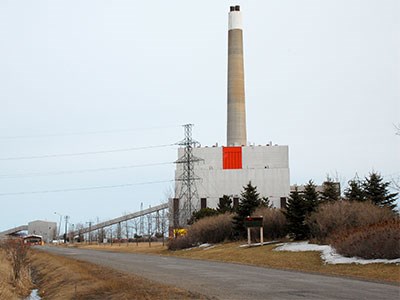Thunder Bay Mayor Keith Hobbs and northwestern Ontario community leaders were planning a “two-pronged attack” on provincial Energy Minister Chris Bentley over electricity supply in a January meeting.
Hobbs and the Northwestern Ontario Municipal Association intended to take the minister to task as Bentley arrived in Thunder Bay, Jan. 17, to deliver an update on the province's controversial decision last November to postpone the conversion of the coal-fired Thunder Bay Generating Station to natural gas.
The surprise decision provoked immediate anger from mayors and organizations across the region.
“We're going to go at this full bore and there's only one answer we want to hear,” said Hobbs: “that it remains open and converted.”
He fears the province's decision to mothball the plant and bring it back online as needed could be a smokescreen for a permanent closure.
At stake are 137 plant jobs in Thunder Bay and the intermediate future of many near-term gold and metal deposits in northwest that could require as much as 700 megawatts of new power.
In a recent letter to Bentley, Hobbs attached comments from mining executives with Cliffs Natural Resources, Rockex Mining, Northern Iron, Gold Canyon Resources and Rainy River Resources.
Though Hobbs would not publicly release the letter, he said all the companies harboured concerns about the reliability of the source of power.
“It seems like folly to go shut down a 306-megawatt generating system in advance of a reliable replacement” was a statement from one miner.
“It is a death spiral if one does not address infrastructure in any society,” wrote another. “Governments cannot put off making decisions on infrastructure because it is an investment in your economic future.”
Northwestern Ontario has a surplus of hundreds of megawatts of power due to the waves of forestry mill closures in the 2000s.
But much of that power is stranded in pockets of the region because of under-capacity or no transmission lines to feed both growing and new mining districts like Red Lake and the Ring of Fire.
“We're going to need it,” said Hobbs. “We have nine to 15 exploration projects in northwestern Ontario scheduled to go into production between 2013 and 2017.
“We've already seen Cliffs back up their chromite project another year. We're foreseeing that these exploration companies will (too) if they don't have the power.”
In a meeting with Bentley last fall in Toronto, Hobbs was told postponing the plant conversion saves the province $400 million.
Hobbs wants to see the research behind that decision at this upcoming meeting which will include senior management from the Ontario Power Authority in attendance.
With the province finally committed to ending coal-burning power generation in Ontario by December 2014, Hobbs said, “we're in a real crunch now because it's going to take two years to do that conversion.”
With Bentley leaving politics shortly, the provincial Liberal leadership race undecided, and an election soon to follow, Hobbs still expects Bentley to make good on a commitment from his predessor, Brad Duguid, to carry out the plant conversion.
“We have to use every resource we can to drive it home to them that we need this plant open. We're going to keep at it until we get the answer we want.”




